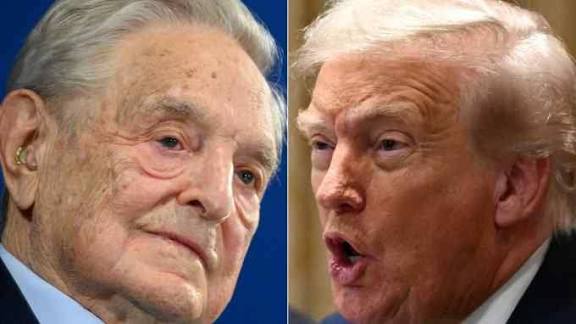Trump vs. Soros: RICO Charges Demanded Reality or Politics,Soros Drops $10M

Billionaire donor George Soros, a major funder of leftist operations for the federal race from District Attorney gave $ 10 million. Today we will discuss about Trump vs. Soros: RICO Charges Demanded Reality or Politics,Soros Drops $10M
Trump vs. Soros: RICO Charges Demanded Reality or Politics,Soros Drops $10M
In August 2025, former and now again sitting U.S. President Donald Trump made a dramatic call: he urged that George Soros—the billionaire philanthropist and longtime target of conservative criticism—and his son, Alex Soros, be charged under the RICO Act (Racketeer Influenced and Corrupt Organizations). He accused them of financing violent protests across the country and claimed their influence had inflicted “great damage” on the nation.
Almost concurrently, attention turned to a major financial move: Soros’s network (through a nonprofit linked to him) making a $10 million political donation in California to support a redistricting initiative. Those two developments—the RICO demands and the $10M drop—heighten a long-running political battle between Trump and liberal philanthropies. But how much is politics, and is there a serious legal underpinning to the RICO call? This article examines both threads, the reactions, the legality, and the broader implications for U.S. political discourse.
Background: Trump, Soros, and a Long-standing Feud

Who is George Soros?
George Soros is a Hungarian-born financier and investor turned philanthropist. Over decades, he has channeled billions into NGOs, civil society organizations, media, human rights efforts, and pro-democracy work under the umbrella of the Open Society Foundations (OSF). His foundation supports causes across the globe, from promoting press freedom to criminal-justice reform.
Given his high profile and political leanings, Soros has long been the target of right-wing criticism—especially among conservatives who see his funding networks as a counterweight to their agenda.
Trump’s Use of Legal Threats in Politics
Trump is no stranger to invoking legal threats or public investigations against critics. Over his career—and especially during his political campaigns—he has repeatedly hinted at or pursued investigations of political opponents, ranging from Hillary Clinton to local district attorneys. Indeed, during his own legal battles, Trump himself faces or has faced criminal and civil proceedings, including in Georgia where prosecutors have alleged racketeering behavior to overturn the 2020 election results.
Thus, the call to bring Soros under RICO must be understood in the context of political power, symbolism, and legal posturing.
The RICO Demand: What Trump Asserts, and What It Entails
What Trump is Saying
On August 27, 2025, Trump posted on Truth Social:
“George Soros, and his wonderful Radical Left son, should be charged with RICO because of their support of Violent Protests, and much more, all throughout the United States of America. … Soros, and his group of psychopaths, have caused great damage to our Country! That includes his Crazy, West Coast friends. Be careful, we’re watching you!”
He claims that Soros and his associates have backed violent protests and that their financial networks operate akin to an “enterprise” warranting Racketeer charges.
Trump and his allies have further framed the issue in light of recent protests, violence, and civil unrest, suggesting that Soros’s foundations or grantees are covertly funding or coordinating these activities.
The Legal Reality: Can You Use RICO This Way?
To assess whether Trump’s demand could have real traction, one must examine what the RICO statute is designed for—and whether the allegations plausibly satisfy its elements.
What Is RICO?
Racketeer Influenced and Corrupt Organizations Act (RICO) is a U.S. federal law originally aimed at organized crime (e.g., mafia, gangs) to hold organizations and their leaders liable for ongoing criminal conduct.
For a RICO case to proceed, prosecutors must establish that a person or organization engaged in a pattern of racketeering activity in connection with an enterprise. Common racketeering predicates include bribery, extortion, money laundering, and other serious crimes (not mere speech or protest).
Importantly, a RICO case often requires proof of criminal acts, not merely political or advocacy behavior.
Given those standards, critiques of Trump’s demand highlight several challenges:
Lack of specificity: Trump has not in his statements laid out concrete acts or evidence linking Soros or his network to violent protest funding (e.g., wire transfers, payments to protestors, coordination). The public remarks remain broad and rhetorical.
First Amendment protections: Many activities by nonprofits, advocacy groups, or grants operate under speech, assembly, or free-expression protections. Funding for advocacy—even controversial or politically divisive—is constitutionally protected unless it crosses into direct coordination of criminal activity.
Political weaponization: Observers warn that invoking RICO against political opponents risks politicizing law enforcement and enabling retaliatory prosecutions.
Burden of proof and prosecutorial discretion: Even if someone attempted to pursue such charges, federal prosecutors and grand juries would require a strong evidence base. The Department of Justice (DOJ) is constrained by rules and political pressures, and often avoids politically fraught prosecutions without clear legal grounds.
Thus, many legal scholars and journalistic observers treat the RICO demand as rhetorical/political theatrics more than a serious prosecutorial blueprint.
Reactions — Pushback and Denials
The Open Society Foundations swiftly responded to Trump’s demands. OSF called the accusations “outrageous and false” and denied any support or funding for violent protests. In particular, they emphasized that:
They do not support or fund violence, but rather promote democracy, human rights, justice, and peaceful civic engagement.
All grantees are required to comply with the law and operate nonviolently.
Critics and commentators also warn that such threats undermine democratic norms, conflating advocacy and dissent with criminality. Some view the RICO call as part of a broader trend in which political power is harnessed to silence or intimidate opponents.
The $10M Drop: Soros’s Political Move
What Happened
In September 2025, reports revealed that George Soros gave $10 million to support a California redistricting initiative (Proposition 50). The effort sought to redraw congressional districts in California potentially benefiting Democratic candidates and weakening Republican-held seats.
This is a substantial infusion and the largest individual donation to the campaign behind Prop 50 so far. It follows Soros’s long pattern of funding political causes, NGOs, and campaigns across states and nations.
Why It Matters
Fueling political narrative: The donation gives Trump and his allies a tangible “smoking gun” to point to—i.e. the argument that Soros doesn’t just fund benign NGOs but is actively shaping state and electoral maps.
Intensifying the feud: The $10M serves as symbolic proof, in the eyes of critics, that Soros has deep pockets and direct influence on U.S. partisan politics.
Broader strategic play: Redistricting is one of the most effective tools in partisanship. By investing here, Soros’s network is making a high-stakes bet on structural control of representation, perhaps counterbalancing what conservative donors do in other states.
Fuel for conspiracy narratives: For those already inclined to see clandestine “globalist” agendas, this kind of large donation in a high-impact state is easily framed as secret engineering of outcomes.
However, this should not be conflated with proof of criminal wrongs. Political donations, even large ones, are generally legal (within campaign finance rules), and don’t by themselves satisfy RICO’s thresholds.
Interplay: RICO Call + $10M Drop — What They Signal
Politics and Symbolic Warfare
The timing of the RICO demand and the revelation of Soros’s $10M donation is more than coincidence—it’s symbolic warfare. Trump is mounting a narrative of “dark money elites” undermining America from behind the scenes. Soros’s donation gives substance to that narrative. Meanwhile, the RICO threat demonstrates an ambition: to transform political grievance into legal action.
Path to Escalation
Even if the RICO call is likely to fail in court, it can still escalate:
Threats of investigation or criminal referrals may intimidate grantees, researchers, or donors.
DOJ or U.S. attorneys might open preliminary inquiries (though not prosecutions) into certain organizations.
Opposing camps may push Congressional oversight, subpoenas, or public hearings into Soros-linked funding.
Legal Limits and Safeguards
The U.S. legal system has guardrails:
Prosecutors typically avoid overtly political cases without strong evidence and independent merit.
Judicial review, motions to dismiss, constitutional defenses (e.g. First Amendment) act as checks.
Civil society and media scrutiny can raise political cost if accusations are overblown or baseless.
In effect, while the RICO call is aggressive, converting it to an enforceable case would require a mountain of evidence, not just rhetoric.
Evaluating Reality vs. Politics
Let’s dissect what seems realistic and what appears political theater.
| Dimension | Likely Reality | Likely Political Motive / Theater |
|---|---|---|
| RICO Charges Succeeding | Highly improbable without new, damning evidence linking Soros to criminal acts | A symbolic attack, raising friction and rallying base |
| Soros’s $10M Donation | Real, documented, within political-donation norms | Used by opponents as evidence of “hidden control” |
| Legal Backlash Against OSF or Grantees | Possible selective inquiries, but full criminal cases unlikely | Intimidation, chilling effect, smearing opposition |
| Public Perception Impact | Some conservatives will see it as proof of Soros’s power; others as overreach | Reinforcement of tribal media narratives and polarization |
| Judicial or Institutional Response | Courts will require high threshold of proof, potential dismissals | Pressure on DOJ, U.S. attorneys, and institutional checks |
Thus, most observers see the RICO call as more political theater than a genuine legal campaign, albeit a dangerous one in a polarized environment.
Broader Implications for Democracy and Civil Society
Weaponizing the Law
When legal instruments like RICO are proposed against political adversaries, it risks transforming the justice system into a tool of partisanship. Critics argue that such threats chill dissent and weaken the separation between politics and law.
Nonprofits, Grants, and Accountability
The episode forces nonprofit actors to reckon with increased scrutiny. Organizations funded by Soros or similar philanthropies may come under greater audit, reputational risk, or even congressional probe, even if they act lawfully.
Escalation of Political Retaliation
This cycle of legal threats and counterattacks deepens political polarization. Each side may feel justified escalating investigations into the other. That heightens the risk of institutional erosion when legal tools are broadly deployed against ideology rather than crime.
Public Trust in Law
Frequent allegations of misuse of law for political ends diminish public trust in institutions. If citizens believe that laws serve power rather than justice, democratic legitimacy suffers.
Conclusion
The clash between Trump and Soros over RICO demands and the $10 million redistricting injection is emblematic of the growing intensification of politics in America. The RICO call is, in its current form, more rhetorical than prosecutorial. It lacks the necessary evidentiary backbone to transform into a successful criminal case. Meanwhile, the $10M drop affirms Soros’s political capacity and feeds narratives on both sides.
Nonetheless, the significance lies not merely in legal outcomes, but in the norms at stake. As political actors increasingly weaponize legal means, the barrier between lawful dissent and alleged criminality narrows. In that context, paying attention to evidence, institutional safeguards, and democratic principles becomes more essential than ever.
How useful was this post?
Click on a star to rate it!
Average rating 0 / 5. Vote count: 0
No votes so far! Be the first to rate this post.
About the Author
usa5911.com
Administrator
Hi, I’m Gurdeep Singh, a professional content writer from India with over 3 years of experience in the field. I specialize in covering U.S. politics, delivering timely and engaging content tailored specifically for an American audience. Along with my dedicated team, we track and report on all the latest political trends, news, and in-depth analysis shaping the United States today. Our goal is to provide clear, factual, and compelling content that keeps readers informed and engaged with the ever-changing political landscape.




